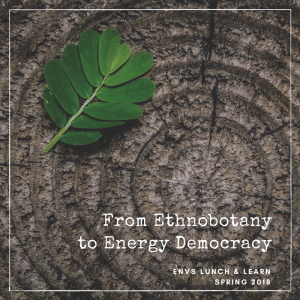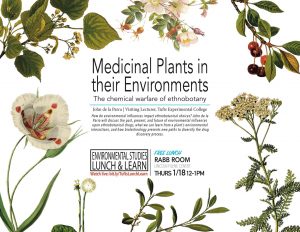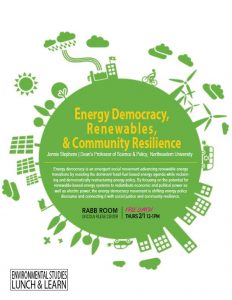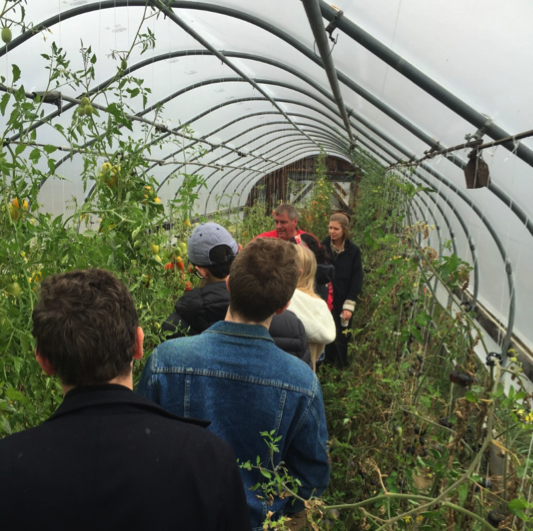Content based on an Environmental Studies Lunch & Learn Talk given to professors, staff, and students at Tufts University. Every week during the academic year, the ENVS Lunch & Learn lecture series features speakers from government, industry, academia and non-profit organizations to give presentations on environmental topics. This is a great opportunity to broaden your knowledge beyond the curriculum, meet other faculty and students and network with the speakers.
Students, faculty, staff, and members of the community are welcome to attend.
This lecture series is co-sponsored by the Tufts Institute of the Environment and the Tisch College of Civic Life.
Medicinal Plants in their Environments: The chemical warfare of ethnobotany
John de la Parra, Visiting Lecturer, Tufts Experimental College
Watch videoRedistributing Power: Energy Democracy, Renewables & Community Resilience
Jennie Stephens, Dean’s Professor of Sustainability Science & Policy, Northeastern University
Watch video
This semester, the Environmental Studies Lunch & Learn series is off to a great start with an emphasis on justice and respecting the knowledge, needs, and problem solving of indigenous people, women, communities of color, and low-income communities.
The first talk of the semester, given by John de la Parra, explored the intersections of indigenous knowledge and medicine, and advancements in the biotechnology sphere that increase consistency of products through standardization and analysis. He began by centering the talk on respecting a woman’s knowledge as powerful, as he explains that in many cultures, medicine people are women who know their way around the local plants. About 80% of the world uses plants to heal themselves. Knowledge of the native plants in a given area points to understanding chemical differences between plants that impact their healing qualities and abilities based on the plants’ own “chemical warfare—reactions to pathogens, weather or drought, other plants, and herbivores.” Ethnobotany pairs the technological advances now available with this indigenous knowledge to grow a huge density of plants within the controlled environment of a bioreactor—needing fewer inputs—to produce concentrated tinctures for different illnesses. De la Parra discusses these lab experiments as a way to dramatically increase accessibility to many treatments by curating very specific and tested directions to grow and create the treatments —and possibly distribute them by drone drop-offs—to people all around the world who may be unable to afford or reach pharmaceuticals. Ethnobotany can produce a product to be used by indigenous cultures to treat existing health problems.
In another talk, Jennie Stephens discussed the movement of Energy Democracy—a concept that connects social change with the energy system transition away from fossil fuels and toward renewable energy. The energy democracy integrates concerns about the environment, climate change, social justice, income inequality, racism, wealth, and human rights. This vision is an alternative to fossil fuel dominated systems, as the fossil fuel industry is the most profitable industry in the world and the biggest contributor to climate change. This resistance is forming as a response to growing inequalities, unequal distribution of the impacts of energy and climate change, and the political power of the fossil fuel industry. Stephens reminds us that we are within this energy transition from fossil fuels, even if we sometimes feel we are stuck without much progress. The Energy Democracy sees this transition as an opportunity to democratize and decentralize energy while intentionally advancing justice through inclusion and awareness of the implications and connections between issues of inequality, justice, climate, and energy. Stephens posits that renewable energy systems offer a possibility, but not a certainty for more democratic energy futures.
Stay tuned for more Environmental Studies Lunch & Learns highlighting the intersections of the environment, climate change, and justice.








Find Us On Social Media!